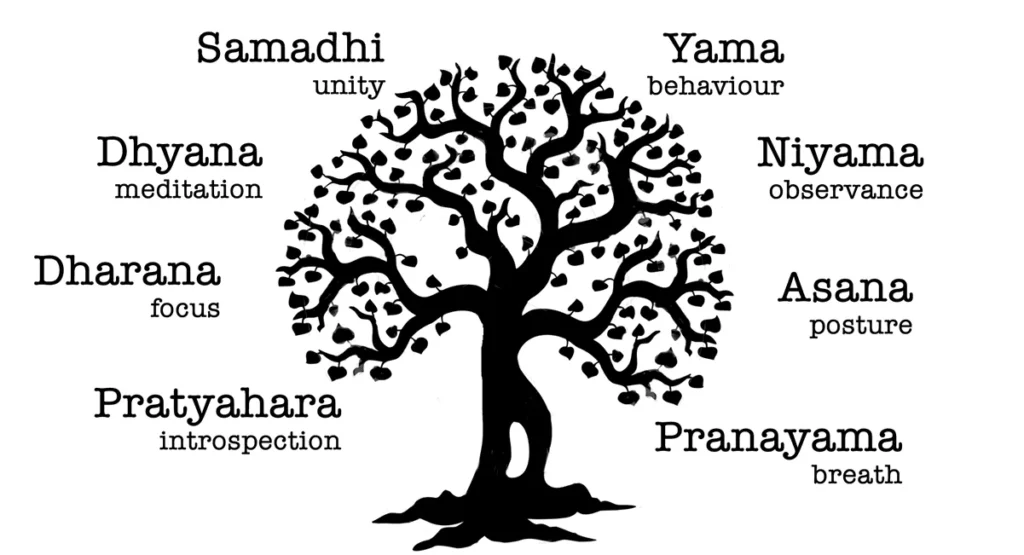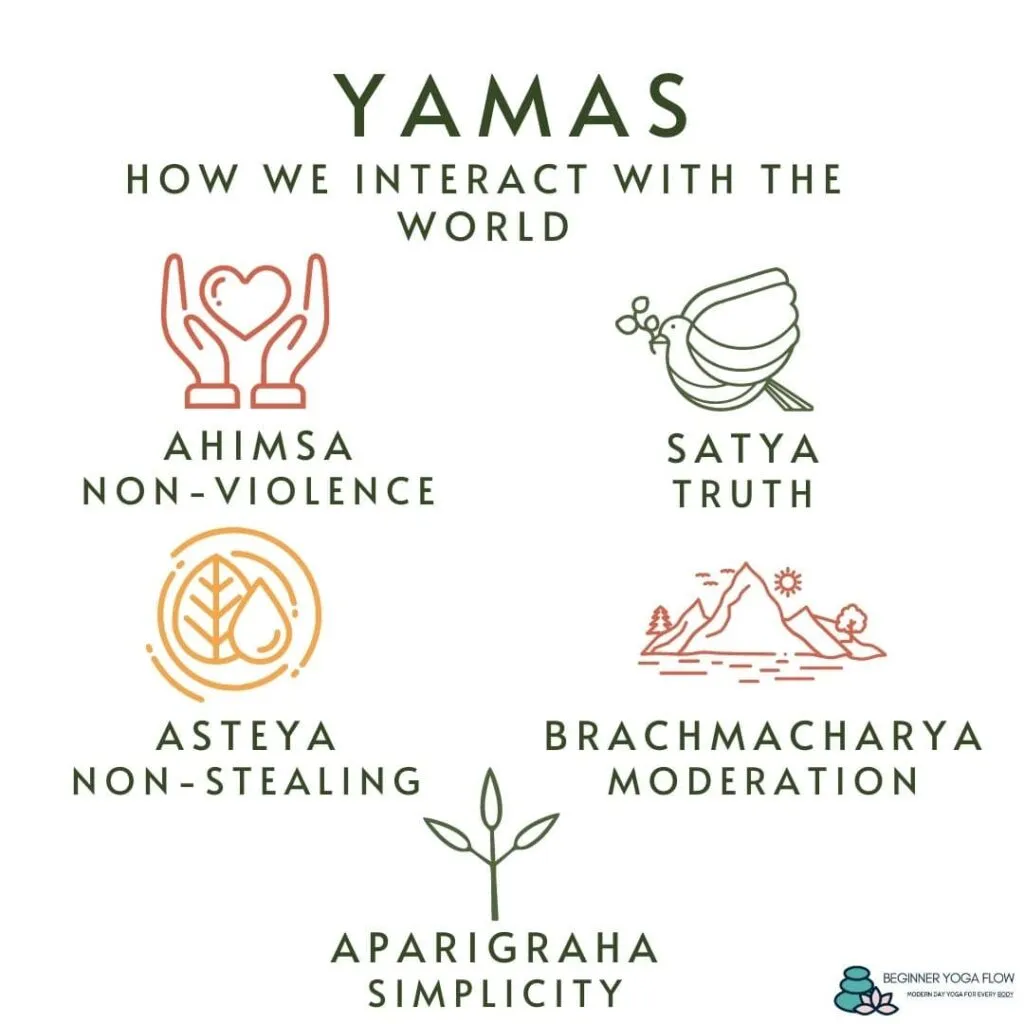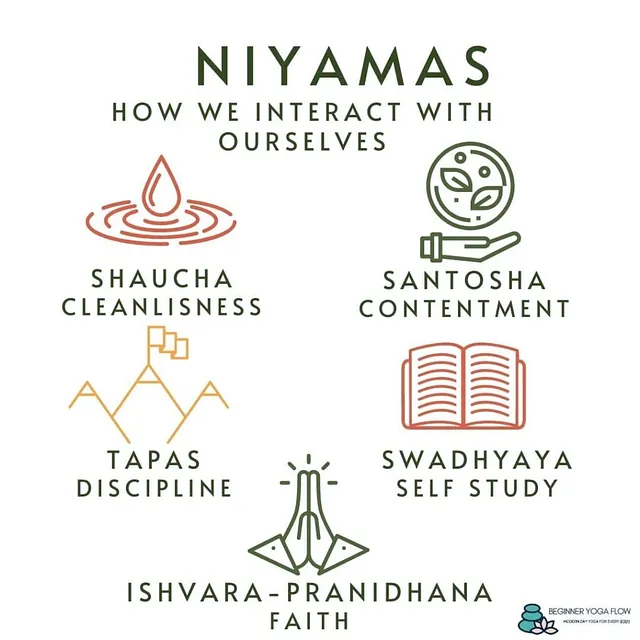
Many people start yoga seeking to address a health concern, while fewer approach it for its ultimate purpose, which is enlightenment. For most, yoga appears to be solely a series of physical postures. However, as we delve deeper, we discover that yoga is a path to enlightenment..
When dive deeper into yoga, the first sacred text everyone refers to is the Patanjali Yoga Sutras. These guidelines create a foundation for a safe, fulfilling, and transformative practice.

The Yamas are the five do’s, guiding principles for ethical conduct towards ourselves and others. They form the cornerstone of a yogic life, both on and off the mat.
- Ahimsa (non-violence): This principle extends beyond physical harm. It encompasses kindness in words, thoughts, and actions towards ourselves, others, and even the environment. Practice ahimsa by fostering compassion, forgiveness, and understanding.
It’s important to understand Ahimsa correctly. While it emphasizes non-violence, it doesn’t mean passively accepting harm. Protecting oneself is not considered violence, and causing harm to oneself falls under the category of violence as well. This concept requires careful understanding and application. - Satya (truthfulness): Be honest with yourself and others. Speak with integrity and avoid embellishment. Truthfulness also extends to being genuine on your yoga journey, acknowledging your limitations and celebrating your progress authentically.
- Asteya (non-stealing): This includes not taking what isn’t rightfully yours, but also extends to respecting intellectual property and avoiding harmful gossip. Asteya on the mat translates to honoring your body’s limitations and practicing safely, not pushing yourself beyond your capacity.
- Brahmacharya (walking in awareness): This broad concept translates to mindful living, using your senses and energy responsibly. It encourages self-discipline and moderation in all aspects of life, including in your yoga practice.
- Aparigraha (non-possessiveness): Let go of attachment to material things, outcomes, and even desires. This doesn’t mean giving everything away, but rather developing a sense of detachment and finding contentment with what you have. On the mat, aparigraha encourages letting go of the need for perfection and embracing your present experience.
The Niyamas: Cultivating Self-Discipline

The Niyamas are the five don’ts, personal observances that foster self-discipline and create a foundation for inner growth.
- Shaucha (purity): This refers to both physical and mental cleanliness. Maintain good hygiene, eat healthy foods, and cultivate a pure mind free of negativity. On the mat, shaucha translates to practicing with a clean body and mind, free from distractions and judgments.
- Santosha (contentment): Cultivate a sense of satisfaction and appreciation for what you have, rather than chasing after desires. This doesn’t mean settling for mediocrity, but finding joy in the present moment and trusting that growth will unfold naturally.
- Tapas (austerity): This refers to self-discipline and effort directed towards your goals. It can involve setting healthy habits, overcoming challenges, and pushing yourself out of your comfort zone, but within safe limits. On the mat, tapas translates to dedicating consistent effort to your practice, even when it’s challenging.
- Svadhyaya (self-study): This involves continuously learning and reflecting on yourself, your practice, and the world around you. Read yoga texts, explore different styles of yoga, and engage in introspection to gain a deeper understanding of your inner self.
- Ishvara Pranidhana (surrender): Acknowledge a higher power or purpose, whatever that may be for you. This doesn’t require subscribing to a specific religion, but rather cultivating a sense of humility and faith in the process of life. On the mat, surrender to the present moment, let go of expectations, and trust in the guidance of your teacher and your intuition.
Understanding and practicing the Yamas and Niyamas isn’t about achieving perfection. It’s about walking on the path of self-discovery, cultivating ethical conduct, and nurturing a sense of well-being that extends beyond the yoga mat and into your daily life.
Remember, these principles are guidelines, not rigid rules. Be kind to yourself, learn from your experiences, and enjoy the process of unfolding your true potential, both on and off the mat.